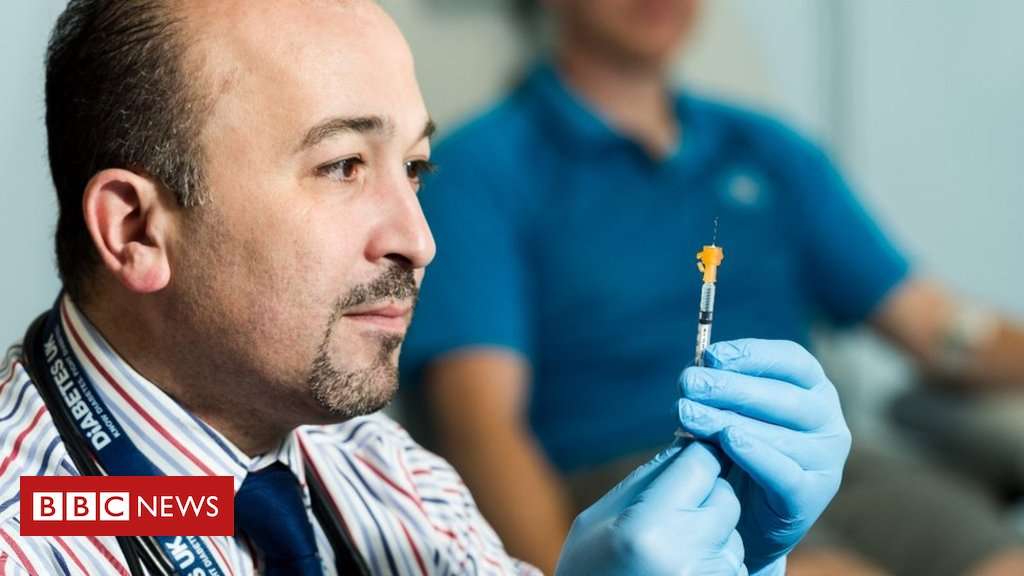Image copyright Cardiff & Vale health board Image caption Two patients have so far been dosed with the new drug and showed no ill-effects after being monitored for 72 hours
A "ground-breaking" drug that helps people with diabetes re-grow insulin-making cells has been developed.
About 19,000 people live with Type 1 of the condition in Wales and 90% have less than 5% of these cells left.
This means they have to inject insulin but it is hoped the new drug will mean patients may not have to in the future.
The trials are being conducted by researchers at Cardiff and Vale University Health Board and two people have already been given the drug.
Currently, it costs the Welsh Government about £500m a year treating people with diabetes.
Problems occur when blood glucose levels in the bodies of diabetics are too high because they are unable to make the hormone, insulin.
The new drug could mean they are no longer dependent on injecting it and this will potentially reduce many of the problems associated with the chronic disease.
While the majority of diabetics (about 170,000) have Type 2, diabetes costs the NHS in Wales approximately £500m a year, 10% of its annual budget.
About 80% of this is spent on managing complications, most of which could be prevented.
The first two patients in the world have been dosed with the investigational drug, which helps re-grow insulin-making beta cells of the pancreas, lost in patients living with the disease.
They were closely monitored over 72 hours and so far, neither has had any major side effects.
The research team is now looking to recruit eight people who have had diabetes for more than two years to take part in wider-ranging trials.
"Despite everything achieved in diabetes care, advances in prevention haven't really occurred," said Dr Mohammad Alhadj Ali, who is working on the trials.
"More insulin-producing beta cells are needed for those with this form of diabetes."
The Welsh Government's Health and Care Research Wales team helps collaborations and the organisation's Carys Thomas said the work could prove "ground-breaking".
She described creating new treatment options for diabetics as "a top priority", adding: "It is essential that the NHS works closely with the pharmaceutical industry on research like this to develop drugs that could make a big difference to people's lives."

SirT6 on September 11st, 2018 at 13:09 UTC »
You should crosspost this to r/sciences (a sub I created for important research that isn't allowed on r/science or other large science-y subs)- we love this type of stuff.
That said, not showing side effects for 72 hours seems like a pretty low bar for "ground-breaking".
EDIT:
The BBC piece is hilariously light on details. I did some digging, this LA Times story does a much better job describing the science. I think this is what the BBC is likely referring to (although, this story is over a year old - maybe a drive to get more participants for the trial? BBC isn't always great on science reporting too...)
Tl;dr: Type 1 diabetes is an autoimmune disorder, where your immune system misidentifies a normal protein as foreign, and attacks and destroys cell that make the protein. In some cases, the immune system of type 1 diabetics recognizes insulin (or at least snippets of it) as the foreign protein. The trial referred to in the article is vaccinating people with insulin-like proteins in hopes of generating "tolerance", forcing the immune system to ignore insulin going forward. The fear is that if you don't get the dosing, formulation or any number of other factors right, you can actually make the autoimmune problem worse. It seems early signs are that this drug is not making it worse. Let's wait and see now if it is making people more healthy.
The research article is here.
Nishatromberg on September 11st, 2018 at 12:01 UTC »
Type 1 diabetes is growing exponentially and this type of research is critical to solving it. As someone who has a son who developed Type 1 at the age of two and thankfully manages well on insulin not all Type 1's have this luxury. Those less fortunate to have poorly controlled Type 1 face sudden death in their mid lives and frequent hospitalisation. Its a condition Type 1's live with
ixos on September 11st, 2018 at 11:45 UTC »
72 hours? I've had hangovers that lasted longer than that.
Keep watching, let's not jump the gun.